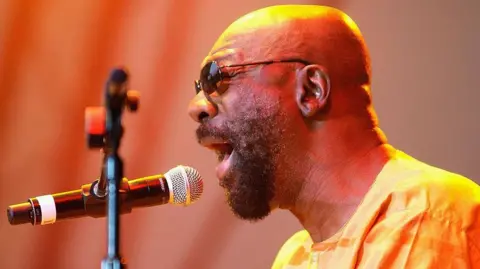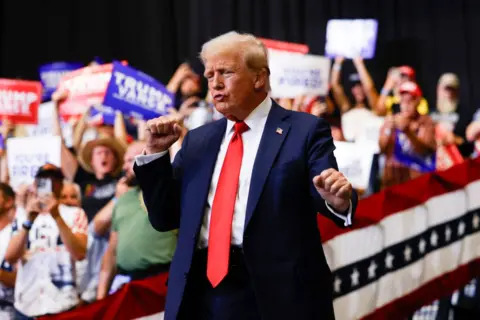Trump ordered to stop using Isaac Hayes' music
 Getty Images
Getty ImagesA US judge has ordered Donald Trump's campaign to stop using the song Hold On, I’m Coming at his rallies, in response to a lawsuit from the family of the song's co-writer, Isaac Hayes.
The Republican presidential nominee regularly plays the song before and after his speeches, including at the Republican National Convention in July.
However, Hayes' family have sued Mr Trump's campaign, saying that it repeatedly ignored requests to stop using the song, made famous by soul duo Sam and Dave in 1966.
The temporary ruling, by Judge Thomas Thrash in Georgia, means the campaign is banned from playing it again until the court case is settled.
However, the judge did not grant a request to order Mr Trump’s campaign to take down recordings of past events in which it had used the song.
Hayes' son, Isaac Hayes III, welcomed the ruling, saying that his father, who died in 2008, would not have endorsed the former President.
"We have to take a stand that we want to separate ourselves from someone with Donald Trump's character," he said outside the Richard B Russell Federal courthouse in Atlanta, Georgia.
"This is not a political issue, this is a character issue."
Ronald Coleman, a lawyer for Mr Trump, said that the campaign had already agreed to "cease further use" of Hold On, I'm Coming (Mr Trump has returned to using the Village People's YMCA since the lawsuit was filed last month).
"We’re very gratified that the court recognised the First Amendment issues at stake and didn’t order a takedown of existing videos," Mr Coleman added.
He also suggested the case could be settled before coming to trial.
"Before we left court, we spoke to the Hayes' attorneys and to Mr Hayes III, about trying to work something out. We want this to be as a cooperative process as possible going forward," he told reporters.
 Getty Images
Getty ImagesHayes composed the song in 1966 with Dave Porter, when he was a staff writer at Stax Records. He went on to become a Grammy and Oscar-winner in his own right, with hits like Shaft and Walk On By.
The star's estate claims that the Mr Trump's campaign used the song on 134 separate occasions after they first asked him to desist.
They are demanding $3m (£2.4m) in licensing fees for the repeated use of the song between 2022 and 2024.
Mr Trump’s lawyers argued that the Hayes estate was not the license holder for the song, and that it had permission to use it, a statement Hayes family lawyers said was “erroneous”.
Dozens of other artists have objected to the use of their songs at Republican rallies, as the US Presidential election draws closer.
Abba, Foo Fighters, the White Stripes singer Jack White, Celine Dion and Johnny Marr have all raised objections in the last month alone.
However, musicians have only had limited success in stopping politicians from using their music, and legal proceedings often drag on for years.
A case from Guyanese-British singer Eddy Grant over Mr Trump's use of his song Electric Avenue is due to be heard in a Manhattan court this Friday, four years after the star's initial complaint.
The star sued Mr Trump over a 2020 campaign video that was soundtracked by a 40-second clip of his song.
The video was viewed 13.7 million times before Twitter took it down, and Grant says this was an unauthorised use for which Mr Trump owes him $300,000 (£229,000) in damages.
As with the Hayes' case, lawyers for Mr Trump argue that the singer does not hold the copyright for his own song.
